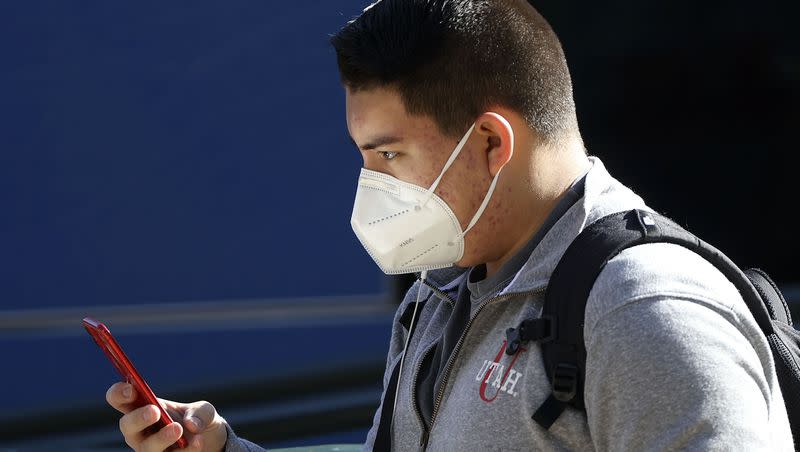What a new study says about the effectiveness of masks against COVID-19

Masks provide protection from COVID-19, says a new study published by the Journal of the American Medical Association.
“Masking in the community to reduce the spread of SARS-CoV-2 (the virus that causes COVID-19) is supported by robust evidence from diverse settings and populations,” the review of previous research posted Tuesday to the JAMA Network concluded.
That data, collected from observational studies, “should inform future responses to epidemics and pandemics caused by respiratory viruses,” the new study found, noting that “rigorous evaluations of mask mandates have found substantial protection.”
Related
The findings came as no surprise to Han Kim, a professor of public health at Westminster University in Salt Lake City who said he plans to use the “really well-done review” in his classes.
“For me, unless something compelling comes along to disprove this, I think the science is pretty settled. I mean, masks work. They’re not perfect, but they’re definitely an important part” of dealing with outbreaks of respiratory viruses, Kim said.
But because the science behind masking “has long been established, the fact that we’re still having this debate leads me to believe this is not a scientific debate, this is a political debate. The science has become largely irrelevant, unfortunately,” he said.
As a result, the professor said the study may not be able to “sway the folks who claim that masking is some sort of socialist plot, that it’s some sort of government control. Those are folks that are kind of already ignoring the scientific literature anyway.”
The study said that more than three years after the start of the COVID-19 pandemic, “the use of face masks in the community remains controversial,” because “disagreement about what the evidence shows about masks—and the implications for their use—persists.”
Despite a “return to a semblance of pre-pandemic life,” thanks to vaccination, treatments, population immunity and other developments, the study warned the virus is still “a disruptive and deadly presence.”
And, the study said, “future epidemics or pandemics caused by pathogens spread by the respiratory route are a near certainty,” meaning that failing to understand the role of masks in preventing the spread of COVID-19 “could undermine our ability to respond.”
The study’s authors are affiliated with Resolve to Save Lives, a New York City-based nonprofit; the University of California at Berkeley; Stanford University; and the Kaiser Permanente Washington Health Research Institute in Seattle.
Their work “is more of what we need,” Kim said. “The data is out there and this is the best kind of review of all the data that I’ve seen on masking and COVID to date, really talking about the pros and cons of each individual study,”
That includes the ethical concerns associated with randomized clinical testing during a lethal pandemic, as well as the practical challenges of ensuring the intervention group always correctly masks when exposed to the virus while the control group never does.
The study points to problems that led to “inconclusive results” in an oft-cited clinical trial in Denmark, such as less than half of the participants in the intervention group reporting that they masked as recommended.
Related
Too much attention has been paid to the few clinical trials on masking, the study said, overshadowing at times “the robustness and nuance” of data from events like the COVID-19 outbreak on the USS Theodore Roosevelt early in the pandemic.
The study said more than 80% of those aboard the aircraft carrier who reported not masking were infected with the virus while the odds of catching COVID-19 were 30% lower for those who said they were wearing masks.
Mask mandates also have been shown to be effective, and are associated with a 45% reduction in COVID-19 infections in Germany and a 25% drop in more than 400 U.S. counties after four weeks, according to the study.
Still, “even the best masks will not provide complete protection,” the study concluded, recommending “a layered response” as the best strategy to limit illness and death from COVID-19.
That includes vaccination against the virus, “isolation of infectious people, and protection through risk reduction—including use of high-quality masks in areas and at times and by vulnerable populations when the pathogen may be spreading.”

